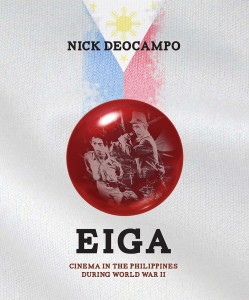Eiga
(livre en anglais)


Moyenne des votes : ![]()
| 0 | vote | |
| 0 | vote | |
| 0 | vote | |
| 0 | vote |
Votre vote : -
Description de l'ouvrage :
Nick Deocampo’s continuing film saga investigates on its third volume how World War II affected the growth of cinema in the Philippines (1942-1945). Revealed in the book is a vast wealth of information about Japanese wartime manipulation of motion pictures that would only lead to the inglorious end of the colonial film cycle at war’s conclusion. This valuable construction of the country’s wartime film history uncovers significant intellectual efforts made by Japanese film critics and film artists who formed the Propaganda Corps assigned to the country. They conceived for Filipinos a “national” identity for their cinema, even while this was wrapped in a fascist, colonial, and militaristic context. Seventy years after the end of World War II, Deocampo triumphs over trauma and forgetfulness as he revisits the wartime period and its cinema. He provides a landmark contribution to historical memory as he uncovers one of the bleakest moments in Philippine film history.
> Sur un thème proche :
Hollywood's Unofficial Film Corps (2025)
American Jewish Moviemakers and the War Effort
Sujet : Pays > Etats-Unis
Projecting Britain at War (2014)
The National Character in British World War II Films
Sujet : Pays > Grande-Bretagne
Philippine Cinematic Art (2022)
de Andrea L. Peterson, Gaspar A. Vibal, Christopher A. Datol et Nicanor C. Lajom
Sujet : Pays > Asie du sud-est
Philippine Cinema 1897–2020 (2022)
Dir. Gaspar Vibal, Dennis Villegas et Teddy Co
Sujet : Pays > Asie du sud-est
City of Screens (2021)
Imagining Audiences in Manila's Alternative Film Culture
Sujet : Pays > Asie du sud-est